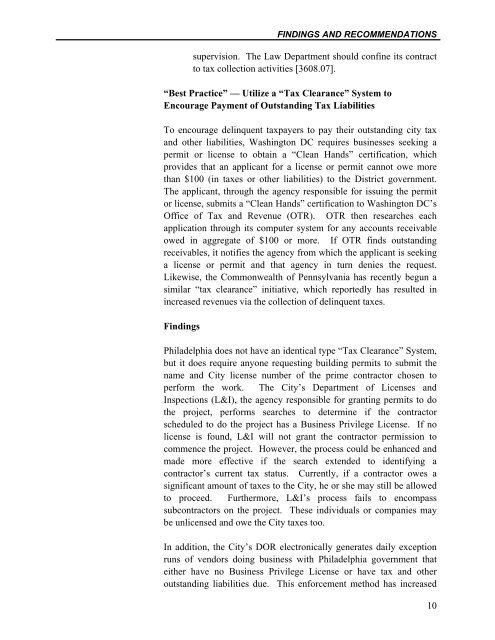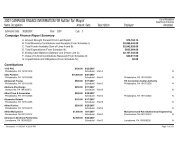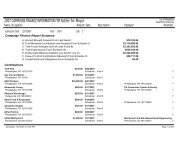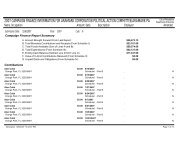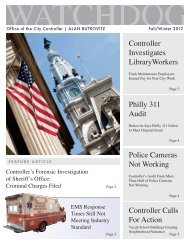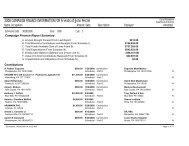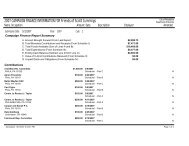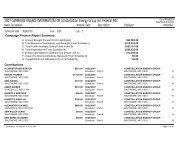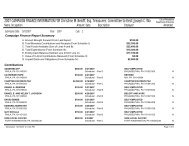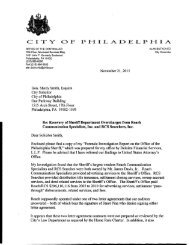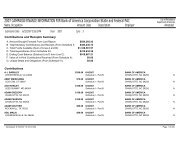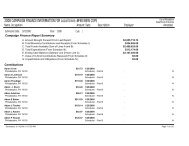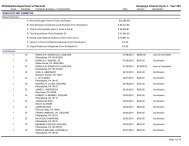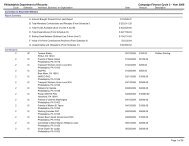department of revenue tax discovery program action steps to
department of revenue tax discovery program action steps to
department of revenue tax discovery program action steps to
You also want an ePaper? Increase the reach of your titles
YUMPU automatically turns print PDFs into web optimized ePapers that Google loves.
FINDINGS AND RECOMMENDATIONS<br />
supervision. The Law Department should confine its contract<br />
<strong>to</strong> <strong>tax</strong> collection activities [3608.07].<br />
“Best Practice” — Utilize a “Tax Clearance” System <strong>to</strong><br />
Encourage Payment <strong>of</strong> Outstanding Tax Liabilities<br />
To encourage delinquent <strong>tax</strong>payers <strong>to</strong> pay their outstanding city <strong>tax</strong><br />
and other liabilities, Washing<strong>to</strong>n DC requires businesses seeking a<br />
permit or license <strong>to</strong> obtain a “Clean Hands” certification, which<br />
provides that an applicant for a license or permit cannot owe more<br />
than $100 (in <strong>tax</strong>es or other liabilities) <strong>to</strong> the District government.<br />
The applicant, through the agency responsible for issuing the permit<br />
or license, submits a “Clean Hands” certification <strong>to</strong> Washing<strong>to</strong>n DC’s<br />
Office <strong>of</strong> Tax and Revenue (OTR). OTR then researches each<br />
application through its computer system for any accounts receivable<br />
owed in aggregate <strong>of</strong> $100 or more. If OTR finds outstanding<br />
receivables, it notifies the agency from which the applicant is seeking<br />
a license or permit and that agency in turn denies the request.<br />
Likewise, the Commonwealth <strong>of</strong> Pennsylvania has recently begun a<br />
similar “<strong>tax</strong> clearance” initiative, which reportedly has resulted in<br />
increased <strong>revenue</strong>s via the collection <strong>of</strong> delinquent <strong>tax</strong>es.<br />
Findings<br />
Philadelphia does not have an identical type “Tax Clearance” System,<br />
but it does require anyone requesting building permits <strong>to</strong> submit the<br />
name and City license number <strong>of</strong> the prime contrac<strong>to</strong>r chosen <strong>to</strong><br />
perform the work. The City’s Department <strong>of</strong> Licenses and<br />
Inspections (L&I), the agency responsible for granting permits <strong>to</strong> do<br />
the project, performs searches <strong>to</strong> determine if the contrac<strong>to</strong>r<br />
scheduled <strong>to</strong> do the project has a Business Privilege License. If no<br />
license is found, L&I will not grant the contrac<strong>to</strong>r permission <strong>to</strong><br />
commence the project. However, the process could be enhanced and<br />
made more effective if the search extended <strong>to</strong> identifying a<br />
contrac<strong>to</strong>r’s current <strong>tax</strong> status. Currently, if a contrac<strong>to</strong>r owes a<br />
significant amount <strong>of</strong> <strong>tax</strong>es <strong>to</strong> the City, he or she may still be allowed<br />
<strong>to</strong> proceed. Furthermore, L&I’s process fails <strong>to</strong> encompass<br />
subcontrac<strong>to</strong>rs on the project. These individuals or companies may<br />
be unlicensed and owe the City <strong>tax</strong>es <strong>to</strong>o.<br />
In addition, the City’s DOR electronically generates daily exception<br />
runs <strong>of</strong> vendors doing business with Philadelphia government that<br />
either have no Business Privilege License or have <strong>tax</strong> and other<br />
outstanding liabilities due. This enforcement method has increased<br />
10


